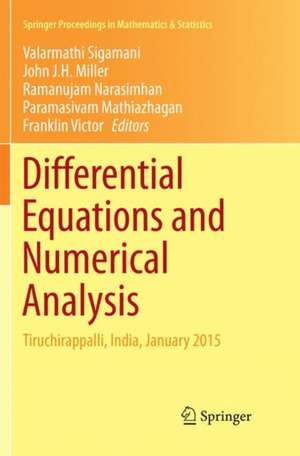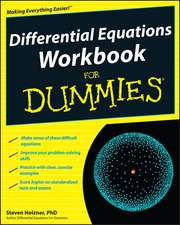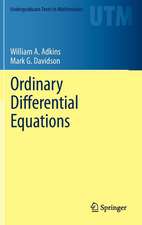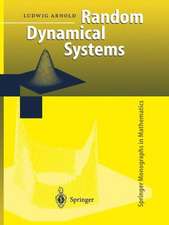Differential Equations and Numerical Analysis: Tiruchirappalli, India, January 2015: Springer Proceedings in Mathematics & Statistics, cartea 172
Editat de Valarmathi Sigamani, John J. H. Miller, Ramanujam Narasimhan, Paramasivam Mathiazhagan, Franklin Victoren Limba Engleză Paperback – 15 iun 2018
| Toate formatele și edițiile | Preț | Express |
|---|---|---|
| Paperback (1) | 634.68 lei 6-8 săpt. | |
| Springer India – 15 iun 2018 | 634.68 lei 6-8 săpt. | |
| Hardback (1) | 640.88 lei 6-8 săpt. | |
| Springer India – 18 aug 2016 | 640.88 lei 6-8 săpt. |
Din seria Springer Proceedings in Mathematics & Statistics
- 15%
 Preț: 642.03 lei
Preț: 642.03 lei - 15%
 Preț: 646.62 lei
Preț: 646.62 lei - 18%
 Preț: 727.31 lei
Preț: 727.31 lei - 24%
 Preț: 1236.82 lei
Preț: 1236.82 lei - 18%
 Preț: 727.97 lei
Preț: 727.97 lei - 18%
 Preț: 1016.01 lei
Preț: 1016.01 lei - 15%
 Preț: 656.43 lei
Preț: 656.43 lei - 18%
 Preț: 947.35 lei
Preț: 947.35 lei - 15%
 Preț: 646.62 lei
Preț: 646.62 lei - 18%
 Preț: 948.92 lei
Preț: 948.92 lei - 18%
 Preț: 1699.47 lei
Preț: 1699.47 lei - 18%
 Preț: 1120.18 lei
Preț: 1120.18 lei - 15%
 Preț: 644.95 lei
Preț: 644.95 lei - 18%
 Preț: 1233.83 lei
Preț: 1233.83 lei - 18%
 Preț: 1120.18 lei
Preț: 1120.18 lei - 18%
 Preț: 1033.37 lei
Preț: 1033.37 lei - 18%
 Preț: 948.92 lei
Preț: 948.92 lei - 18%
 Preț: 896.08 lei
Preț: 896.08 lei - 18%
 Preț: 1115.46 lei
Preț: 1115.46 lei - 18%
 Preț: 952.09 lei
Preț: 952.09 lei - 18%
 Preț: 1230.66 lei
Preț: 1230.66 lei - 15%
 Preț: 647.59 lei
Preț: 647.59 lei - 18%
 Preț: 1124.92 lei
Preț: 1124.92 lei - 20%
 Preț: 1630.95 lei
Preț: 1630.95 lei - 18%
 Preț: 1123.35 lei
Preț: 1123.35 lei - 18%
 Preț: 950.52 lei
Preț: 950.52 lei - 18%
 Preț: 947.35 lei
Preț: 947.35 lei - 18%
 Preț: 1003.70 lei
Preț: 1003.70 lei - 18%
 Preț: 956.81 lei
Preț: 956.81 lei - 18%
 Preț: 889.75 lei
Preț: 889.75 lei - 18%
 Preț: 1000.24 lei
Preț: 1000.24 lei - 18%
 Preț: 1122.56 lei
Preț: 1122.56 lei - 18%
 Preț: 1005.74 lei
Preț: 1005.74 lei - 18%
 Preț: 950.96 lei
Preț: 950.96 lei - 18%
 Preț: 1009.08 lei
Preț: 1009.08 lei - 18%
 Preț: 1008.91 lei
Preț: 1008.91 lei - 18%
 Preț: 947.35 lei
Preț: 947.35 lei - 18%
 Preț: 1113.89 lei
Preț: 1113.89 lei - 18%
 Preț: 1113.71 lei
Preț: 1113.71 lei - 18%
 Preț: 1400.35 lei
Preț: 1400.35 lei - 18%
 Preț: 969.44 lei
Preț: 969.44 lei - 18%
 Preț: 1401.93 lei
Preț: 1401.93 lei - 18%
 Preț: 948.92 lei
Preț: 948.92 lei - 18%
 Preț: 1392.46 lei
Preț: 1392.46 lei - 20%
 Preț: 878.66 lei
Preț: 878.66 lei - 20%
 Preț: 1002.90 lei
Preț: 1002.90 lei - 18%
 Preț: 1120.99 lei
Preț: 1120.99 lei - 18%
 Preț: 942.63 lei
Preț: 942.63 lei - 18%
 Preț: 1113.09 lei
Preț: 1113.09 lei
Preț: 634.68 lei
Preț vechi: 746.69 lei
-15% Nou
Puncte Express: 952
Preț estimativ în valută:
121.47€ • 126.33$ • 101.65£
121.47€ • 126.33$ • 101.65£
Carte tipărită la comandă
Livrare economică 14-28 martie
Preluare comenzi: 021 569.72.76
Specificații
ISBN-13: 9788132238621
ISBN-10: 8132238621
Ilustrații: XI, 165 p. 21 illus.
Dimensiuni: 155 x 235 mm
Greutate: 0.26 kg
Ediția:Softcover reprint of the original 1st ed. 2016
Editura: Springer India
Colecția Springer
Seria Springer Proceedings in Mathematics & Statistics
Locul publicării:New Delhi, India
ISBN-10: 8132238621
Ilustrații: XI, 165 p. 21 illus.
Dimensiuni: 155 x 235 mm
Greutate: 0.26 kg
Ediția:Softcover reprint of the original 1st ed. 2016
Editura: Springer India
Colecția Springer
Seria Springer Proceedings in Mathematics & Statistics
Locul publicării:New Delhi, India
Cuprins
Elementary Tutorial on Numerical Methods for Singular Perturbation Problems.- Interior Layers in Singularly Perturbed Problems.- Singularly Perturbed Delay Differential Equations and Numerical Methods.- Initial or boundary value problems for systems of singularly perturbed differential equations and their solution profile.- Convergence of the Crank Nicolson Method for a singularly perturbed parabolic reaction-diffusion system.- Iterative Numerical Method for a System of Singularly Perturbed Reaction - Diffusion Equations with Negative shifts.- Parameter Uniform Numerical Method for Second Order Singularly Perturbed Turning Point Problems with Robin Boundary Conditions.- Numerical Method for a Singularly Perturbed Boundary Value Problem for a Linear Parabolic Second Order Delay Differential Equation.- A Parameter Uniform Numerical Method for an Initial Value Problem for a System of Singularly Perturbed Delay Differential Equations with Discontinuous Source terms.- A parameter uniform first order convergent numerical method for a semilinear system of singularly perturbed second order delay differential equations.
Notă biografică
Valarmathi Sigamani is assistant professor at the Department of Mathematics at Bishop Heber College, Tiruchirappalli, Tamil Nadu, India. She did her doctoral studies in numerical analysis at Bharathidasan University, Tiruchirappalli, under the guidance of Prof. N. Ramanujam. She has been teaching algebra, analysis, topology, calculus of variations, computer programming and differential equations to undergraduate and postgraduate students of mathematics. She has published 20 research articles in various reputed international journals and has guided 5 students and guiding some more in their doctoral studies in singular perturbation problems and numerical analysis. Currently, she is working on the qualitative and quantitative analysis of singularly perturbed multi-scale dynamical systems and their applications in biology. She is a council member of the Institute of Numerical Computation and Analysis (INCA), Dublin, Ireland, and is a member in various mathematical societies.
John J.H. Miller is director of the Institute for Numerical Computation and Analysis (INCA), Dublin, and professor emeritus of mathematics at the Trinity College, Dublin. He obtained two undergraduate degrees at Trinity College, University of Dublin, Ireland: one in mathematics and the other in natural sciences. He then studied numerical analysis at the Massachusetts Institute of Technology under the supervision of Gilbert Strang, where he was awarded a PhD degree. His mathematical interests include power bounded matrices, the zeros of polynomials, numerical methods for modelling semiconductor devices, asymptotic and computational methods for problems exhibiting boundary and interior layers, data analysis of signals from neurons and, recently, the mathematical modelling and construction of oscillating water column devices for generating electric power from ocean waves. He has written over 100 papers on these topics, as well as 3 research monographs.
Ramanujam Narasimhan is an honorary professor of mathematics at Bharathidasan University, Tiruchirappalli, Tamil Nadu. He worked under the guidance of Dr. U.N. Srivastava and got his PhD degree from the Indian Institute of Technology Madras. His research interests include differential equations and numerical analysis. He has published over 85 papers in various international journals and has guided 11 students in their doctoral studies. He has been teaching various courses such as ordinary differential equations, partial differential equations, numerical analysis, functional analysis, fluid dynamics, computer programming, real analysis, integral equations and calculus of variations. He has served in many responsible positions including the vice-chanceller (in-charge) of Bharathidasan University.
Paramasivam Mathiyazhagan is assistant professor of mathematics at Bishop Heber College, Tiruchirappalli, Tamil Naud. He got his PhD from BharathidasanUniversity in 2013. His research interests include numerical analysis and boundary layer theory. He has worked on the multi-scale reaction-diffusion problems and has published articles in reputed international journals. He has been teaching various courses such as partial differential equations, functional analysis, fluid dynamics and computer programming. Apart from mathematics, he is a brilliant cricketer who played for the university during his college days.
Franklin Victor is assistant professor of mathematics at Bishop Heber College, Tiruchirapalli, Tamil Nadu. He completed his doctoral studies in numerical methods for solving singularly perturbed partial differential equations of parabolic type. Recently, he got interest in delay differential equations and is currently working on numerical methods to solve singularly perturbed delay differential equations. His other research interests are mathematics of finance and Black–Scholes equations. He has been teaching various courses such as mathematical analysis, ordinary differential equations and partial differential equations. Besides mathematics, he is a talented musician. He is a reputed choral arranger and a conductor of various ensembles of his region.
Textul de pe ultima copertă
This book offers an ideal introduction to singular perturbation problems, and a valuable guide for researchers in the field of differential equations. It also includes chapters on new contributions to both fields: differential equations and singular perturbation problems. Written by experts who are active researchers in the related fields, the book serves as a comprehensive source of information on the underlying ideas in the construction of numerical methods to address different classes of problems with solutions of different behaviors, which will ultimately help researchers to design and assess numerical methods for solving new problems. All the chapters presented in the volume are complemented by illustrations in the form of tables and graphs.
Caracteristici
Describes recent developments in the field of research on differential equations Shows researchers how to design and analyze numerical methods for solving new problems Helps readers construct numerical methods to address different classes of problems with solutions of different behaviors Includes supplementary material: sn.pub/extras











